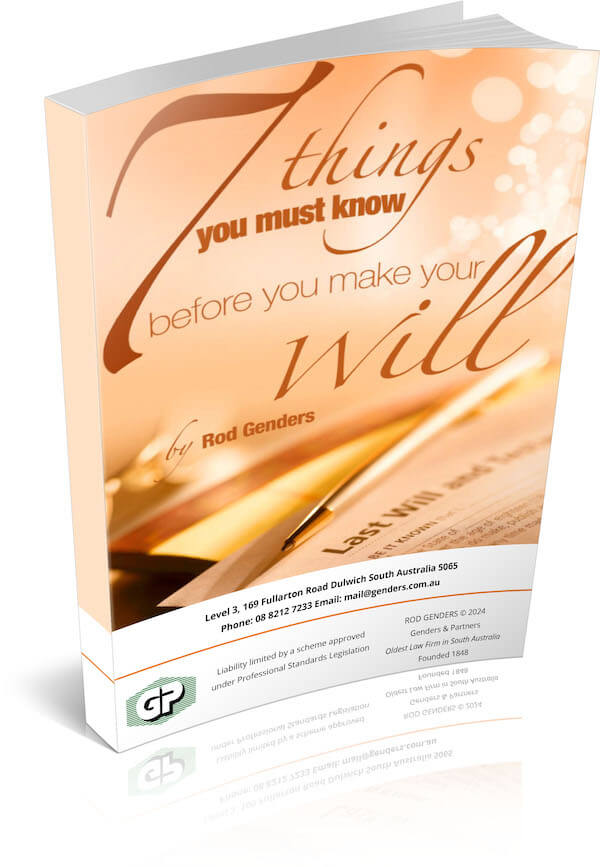
COVID has been scary and frustrating for most of us, and the future remains uncertain.
But if you were looking for a silver lining in all this, I can maybe offer two observations:
1. People have had to learn how to connect digitally a lot more efficiently, so we are all a lot more familiar with zoom meetings now.
This will hopefully mean that we stay connected a bit better from now on, no matter how busy the world gets again.
2. In 2020 people had more time – and inclination – to put their affairs in order, so more of us are getting around to doing proper estate planning.
Getting started on estate planning can be daunting task, especially when we are getting along in years.
We Baby Boomers are on the brink of retirement, and there are definitely some sure-fire approaches to take –as well as some serious pitfalls to avoid.
1. Leverage your Super efficiently
Did you know that there is a way you may be able to increase your Super without reducing your net spendable income?
Since 1 July 2005 the Transition To Retirement – Conditions of Release Scheme has existed to provide a tax efficient strategy to allow those who have reached their preservation age, and are still working, to access their super in the form of a transition to retirement (TTR) income stream.
This effectively allows individuals to commence a pension early, making use of concessionally- taxed superannuation benefits before retirement.
This presents a potential opportunity for you to restructure the way you presently receive your income, such that you can retain your present level of income, and potentially significantly increase the balance of your superannuation when you retire!
For those who have reached age 60, the pension withdrawals are tax-free.
For those aged less than 60, the income comes with a tax credit reducing the amount of personal tax payable on the pension income.
Either way it can create a tax effective income which can then allow you to contribute more to your super, reducing your personal tax and increasing your overall balance without reducing your net spendable income.
You can only take advantage of this strategy if you have reached your preservation age.
2. The Centrelink five-year look-back
Most Australian citizens are familiar with Centrelink, a government agency that pays for the aged-pension (among many other things).
But what many people don’t know is that if they exceed the Centrelink eligibility limits in income and assets, Centrelink will reduce the amount of pension you may be entitled-to.
In order to address this, you can legally reduce your assets in specific ways. One way is to purchase an annuity. This converts a capital lump sum to an income stream.
If you are currently asset-rich but income-poor, this could be a good strategy to maximise both your pension entitlements and your income.
You can also give-away some of your assets. For pension-planning purposes, the best time to give away assets is more than 5 years before you apply for the pension.
This is because Centrelink have strict rules about how much you can give away before it starts to affect your pension, and they can (and will) look back at all gifts (and loans) you have made up to 5 years before you apply for the pension.
However if you are prepared and disciplined enough to make the gifts more than 5 years before you apply for the pension, Centrelink will not currently take these assets into account.
3. Reverse mortgages: the good, the bad, and the ugly
There’s been a good deal of recent news coverage about reverse mortgages, which is a special type of loan that allows a homeowner to convert a portion of the equity in his or her house into cash.
But unlike a traditional home equity loan, a reverse mortgage does not have to be paid back until the person no longer lives in the home and/or does not keep the taxes and insurance current.
Those who opt to pursue a reverse mortgage can receive the money as a lump sum, monthly cash advance, or a combination of the two.
Since they’re available to anyone regardless of current income and don’t have to be paid back until the homeowners either sell the house, pass away, or fail to keep taxes and insurance up-to-date, some people think that a reverse mortgage is a great idea–but it’s a decision that still needs careful consideration.
There are definite downsides to setting up a reverse mortgage.
Since the loans have to be paid back once the house is sold or the homeowner passes away, those who stand to inherit the homeowner’s equity will be unable to do so to use the home equity to care for their loved ones.
Reverse mortgages may also impact your Centrelink eligibility.
Reverse mortgages have higher interest rates than a regular loan and have higher fees associated with them.
Exercise considerable caution when considering a reverse mortgage.
4. Insurance bonds can pay expenses and equalise wealth transfer
Insurance bonds are financial products which can bypass your deceased estate, and so their purchase can help to protect your assets from estate-creditors, claimants & predators, covering the tax bill & other estate expenses and preserving the assets for specific beneficiaries.
These bonds are typically owned outside the estate so they are not subject to estate litigation themselves, and this process allows you to provide unique tax benefits that allow the tax-efficient transfer of wealth to your nominated beneficiaries, and allows for an immediate death benefit free from probate.
5. Don’t go guarantor for your kids
Nowadays, young adults are finding it difficult to get their start in buying a home.
Casual work, the ‘gig economy’, tightened credit restrictions from the banks, student (HECS) loans, skyrocketing house prices and COVID complications have all added to their difficulties.
It is natural for us Baby Boomer parents to want to help them. However do not be tempted to sign bank loans as a guarantor for them. It leads to disaster and family breakdown in many situations.
A better alternative is to enter into a written loan agreement with your natural child (ie if they are in a couple, do not loan to both of them – only to your child).
In this way, they can have a big deposit to make their bank happy, and avoid the cost of expensive mortgage insurance for them.
It protects you in case you ever need to get that money back – say if you need to buy into a nursing home later in life.
It also protects your child’s inheritance in case they split from their partner, and their house is sold and the proceeds split between them.
Since more than 50% of relationships now end in separation/divorce, this is a real risk.
Of course your child will not see it that way – they are in love and will not be willing to even consider the possibility that their relationship could fail.
However statistics do not lie, and you can afford to be a little clearer-eyed than they are!
If your child separates from their partner/spouse, then you can claim repayment of the loan (plus interest if you wish), BEFORE the nett proceeds of the sales of their house is divided with the ex-partner.
This should mean that you will get your money back, and the ex-partner does not benefit from your generosity.
Of course you can then choose to re-lend it to your child after their break-up, to help them recover quicker from their reversal of fortune.
6. Women need to be prepared to manage the money by themselves
On average, women live six years longer than men.
If the wife lives longer than their husband and he is the one who handles all of the financial decisions, they’ll be at a disadvantage once they have to manage things by themselves.
You should seek out financial literacy programs in your area so that you can educate yourself on financial matters in order to better prepare in case you should have to make financial decisions on your own.
7. Create an Enduring Power of Attorney
An Enduring Power of Attorney allows a person to appoint someone they know and trust to make important decisions about financial, property and related legal matters. This authority can be activated straight away or only if and when the person who makes it loses mental competence.
It is a document by which you authorise another person or persons to act for you during your lifetime in respect of your financial affairs. Think: contracts, bank accounts, government departments, shares, real estate, insurances, etc.
An Enduring Power of Attorney continues to operate in the event that you later become mentally incapacitated after, for example, an accident or suffering a stroke or becoming senile.
By signing a Power of Attorney you do not lose control over your affairs while you are able to manage them, and you can place limitations on your agent which vary according to your requirements, but most people execute an unrestricted Enduring Power of Attorney. However, for obvious reasons you have to be careful who you appoint as your attorney, who must be somebody you can trust.
It is very powerful, but inexpensive, insurance to guard against the risk of having no-one able to sign documents on your behalf if you cannot do so for yourself. But like insurance, you have to have it in place before the disaster strikes.
As always, we emphasise that this is general information for education purposes only – it is not legal advice and does not take into account your specific circumstances or requirements.
Specialist advise from an estate planning lawyer, and a financial planner/accountant is highly recommended before you act upon any of the matters discussed in this article.
Contact us to learn more about retirement planning, superannuation, estate-planning and estate-administration solutions, by visiting our website today and schedule a free no obligation telephone consultation to find out how we can help you and yours.
Remember – any mistakes you make in your Will won’t become apparent until after you’re dead, and it’s too late for you to fix them. Get proper advice, and do it right.
It is also vitally important that you keep your Will and estate plan up to date – it is not a set-and-forget exercise.
To learn how to protect yourself, your family and your assets, by creating a professionally-made estate plan, claim your FREE 15 minute Telephone Consultation
SPECIAL REPORT “7 Things You Must Know Before You Make Your Will”
In this report you will Learn:

Why home-made Wills can be a LOT more expensive than you might think.
The secret weapons used by the rich & powerful to protect their assets, and transfer their wealth two or three generations ahead.
How Estate and Trustee Companies make BIG money from “free” Wills.
The Most Common Estate Planning Mistakes, how they can cost your family a fortune, and How to Avoid Them.
The Elements of a Sound Estate Plan – why a Will alone is not enough.
How to Make Sure Your Assets Stay in Your Family and are not lost to creditors, lawsuits or ex-spouses.
How to guard against challenges to your Estate after you’re gone.







